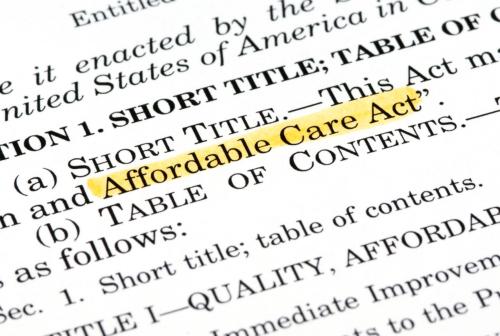Now that Republicans control both Congress and the White House, talk of repealing and replacing the Affordable Care Act (aka “Obamacare”) has accelerated. But as Americans nationwide voice concerns in congressional town halls about repeal, the process may not proceed as rapidly as ACA opponents had hoped. What are the pitfalls to repeal, and what are the possibilities for reform, of the Affordable Care Act? It’s a subject that Brookings experts have long-studied and on which they have many policy recommendations. A collection of some of the most recent analyses and recommendations are presented below.
NEW: Henry Aaron, “The Republican health policy agenda is getting more wobbly by the day“
THE POLITICAL CHALLENGE OF REPEALING OBAMACARE FOR THE GOP

Alice Rivlin, a senior fellow in Economic Studies and the Center for Health Policy at Brookings, observes that Republicans are having a hard time designing a replacement for Obamacare because while they “could agree on trashing Obamacare … they did not have a common intellectual basis for designing a replacement and they still don’t.”
Senior Fellow Henry Aaron describes three reasons why Republicans will fail in their promise to repeal and replace Obamacare: the Affordable Care Act “has largely succeeded not failed”; “it is impossible for the stated goals of repeal to be achieved”; and the political fallout would be “devastating.” Opponents of Obamacare “are in for a dose of humiliation as they realize belatedly that the promises they have been making for six years are empty,” Aaron says, and adds that one way to preserve the ACA’s “remarkable gains” would be to give states more latitude in implementing provisions of the law.
Senior Fellow Bill Galston explains one “political problem” the GOP faces in any attempt to alter Medicaid expansion, a key part of health insurance expansion under the Affordable Care Act. The states won by Donald Trump in 2016, Galston writes, “disproportionately benefitted from the expansion of Medicaid that was one of the building-blocks of Obamacare, and they will suffer disproportionately from Medicaid cuts.” Galston points to data in such states as Kentucky, West Virginia, and Arkansas where voters chose Trump by large margins, but also where the drop in the uninsured rate was very high. In short: “the Medicaid changes that congressional Republicans advocate will reduce benefits and eliminate coverage for millions of Americans who voted for Donald Trump.”
WHAT WOULD HAPPEN IF OBAMACARE WERE REPEALED WITHOUT A REPLACEMENT?

In a December report from the Schaeffer Initiative for Innovation in Health Policy, Alice Rivlin, Loren Adler (the associate director of the Center for Health Policy), and Senior Fellow Stuart Butler wrote that repealing the ACA “without a replacement in hand is almost certainly a disastrous way to start.” In addition to the millions who would lose coverage through the individual market, a delayed repeal with the “hope” of replacement—one that eliminates subsidies and mandates but leaves the insurance regulations in place—“risks nearly destroying the individual market altogether if no replacement emerges.”
Henry Aaron and Urban Institute scholar Robert Reischauer, writing about a new Urban Institute study, argue that “repeal [of the Affordable Care Act] without having an agreed-upon plan for replacement in place is a recipe for calamity.” Aaron and Reischauer note that passage of a budget resolution that makes tax-related provisions of the ACA not subject to the Senate filibuster makes repealing significant provisions of the ACA relatively easy, but doing so without replacement “would leave more people without insurance than would have been the case if the law had never been passed.” Plus, “the price tag for uncompensated care would skyrocket—by an estimated $1.1 trillion over the succeeding decade” and repeal of the individual mandate would lead to healthy people dropping coverage, “leaving insurers with a pool of sicker- and costlier-than-average customers.”
“It would be better to fix [Obamacare’s] flaws than destroy its accomplishments,” Aaron and Reischauer argue, but if it must be repealed, they advocate doing so in a bipartisan manner “that deals with health insurance comprehensively.”
Rivlin also wrote that “repeal by itself would create a human and political disaster.” She said:
At least 20 million people would lose their health insurance; millions of others would be unable to buy affordable coverage in a chaotic individual insurance market; many doctors, hospitals and other health providers would lose paying customers; and states would feel the pinch of cuts in federal Medicaid money. Ironically, many of the states that made the most dramatic progress reducing their uninsured populations under Obamacare, and would suffer the most disruption from repeal, are the Rust Belt and Appalachian States that put Trump over the top.
Listen to a recent 5 on 45 podcast episode, in which Rivlin rebuts charges that Obamacare is “collapsing,” as House Speaker Paul Ryan recently claimed.
If the Affordable Care Act were repealed before a replacement plan was in place, tens of millions of Americans would lose health insurance. But one GOP legislative approach from 2016 would also cut taxes on high-income households and the health care industry, making it “more difficult to achieve a sustainable replacement plan that provides meaningful coverage without increasing deficits,” according to Adler and Senior Fellow Paul Ginsburg, director of the health policy center. They show why “the revenue lost from the ACA’s tax increases would no longer be available to finance a plan to replace the lost coverage expansions,” resulting in a huge coverage gap for any replacement plan.
IDEAS TO FIX OBAMACARE

Alice Rivlin suggests possible courses of action for repairing Obamacare, which she says “would have needed repair even if Democrats had won the election.” While noting the sources of opposition to each, she describes three ideas in particular: “stick with federally subsidized insurance” but replace the unpopular mandates “with incentives and generous subsidies toward the cost of the sickest enrollees”; substitute Health Savings Accounts and catastrophic insurance for ACA subsidies, and roll Medicaid expansion into a block grant; and allow states “a lot of flexibility to decide that they want the replacement for Obamacare to be in their states.”
Henry Aaron writes that “While the ACA has been indisputably successful in achieving its larger goals, any legislation that fundamentally changes a $3 trillion chunk of the U.S. economy is bound to contain some mistakes and to run into some policy potholes.” Prior to the 2016 presidential election, Aaron noted that some of the problems with the ACA—among them the “family glitch” and some problems insurance companies experienced operating on the health exchanges—could have been fixed fairly easily.
Rivlin also comments on the possibility for “TrumpCare,” where the president brokers a new deal “that preserves the best aspects of Obamacare, fixes its design flaws, and turns it into a sustainable program with his name on it.” She suggests ideas for fixes to these flaws, including: making it more attractive for younger, healthier people to enroll without a mandate and giving people who live in sparsely populated rural areas more options at affordable cost through interstate compacts that broaden insurance pools across state lines.
Stuart Butler calls former President Obama’s “impulse to conduct an intensive intervention to fix major parts of the U.S. health system” understandable but unwise. “Seeking to replace the Affordable Care Act (ACA) with another intensive intervention would also be very unwise,” he adds. Butler proposes three aspects of a legislative strategy to incrementally replace Obamacare, including: seeking bipartisan action in Congress; recognizing that “the information and knowledge needed to guide the evolution of our health system is decentralized and constantly changing”; and giving states “as much flexibility as possible to achieve the national goals of a health system.”
Rivlin agrees that any replacement for Obamacare “must have broad bipartisan support.”
In their December report, Rivlin, Adler, and Butler described what an ACA replacement plan should focus on, including offsetting the negative impacts of repealing the individual and employer mandates, loosening age rating restrictions in the individual market, and doing more to encourage states to apply for Section 1332 waivers. “Fixing the ACA is important,” they write, “but replacing it with a durable plan to make health coverage broadly affordable will take time and constructive bipartisan collaboration.”
RESEARCH ON WHAT’S WORKING IN HEALTH POLICY

In a new report co-sponsored by the Center for Health Policy at Brookings and the Nelson A. Rockefeller Institute of Governance, the authors (Michael Morrisey, Richard Nathan, Alice Rivlin, and Mark Hall) examine data from the ACA Implementation Research Network on health insurance marketplaces in California, Michigan, Florida, North Carolina, and Texas, with a particular focus on implementation and competition among insurers. The authors developed a set of testable hypotheses that they say are “critical” to the success of new efforts to repeal and replace the ACA.
Matthew Fiedler, a fellow in the Center for Health Policy at Brookings, examines final data on people who signed up for health insurance coverage via HealthCare.gov. He says the data “provide strong evidence that premium increases did not cause dramatic enrollment declines, much less spark a death spiral.” Instead, other factors instead, Fiedler says, are responsible for the slight decline from 2016 to 2017. He also argues that “the enrollment decline will likely have only minor effects on the individual market risk pool and therefore create only a slight headwind to insurers’ efforts to stem their recent individual market losses.”
The Affordable Care Act banned the insurance practice of lifetime limits on coverage and no annual out-of-pocket limits. Loren Adler and Paul Ginsburg argue that any replacement or reform of the ACA should maintain these provisions. Maintaining the annual out-of-pocket limits protects the sickest patients from paying costs beyond their ability to pay. And having no lifetime limit under the ACA “is one of the key ways in which the ACA benefits people with employer-provided health insurance, and it represents a valuable gain for many with chronic and catastrophic conditions.”
For more research and recommendations from Brookings experts on the Affordable Care Act and health policy generally, see:
- Repeal and replace Obamacare: what could it mean?, by Stuart Butler
- Health policy issues and the 2016 presidential election, by Alice Rivlin and Robert Reischauer
- How to rescue Obamacare as insurers drop out, by Henry Aaron
- The wallflower at the Obamacare party, by Henry Aaron
- Affordable Care Act premiums are lower than you think, by Loren Adler and Paul Ginsburg
- Center for Health Policy at Brookings
- All research and commentary on health care policy
For ongoing updates about what is happening with health policy under the Trump administration and Congress, bookmark and follow the Schaeffer Initiative for Innovation in Health Policy, a partnership between the USC Schaeffer Center for Health Policy & Economics and the Center for Health Policy at Brookings.







Commentary
What Brookings experts are saying about Affordable Care Act (Obamacare) repeal/replace
February 22, 2017